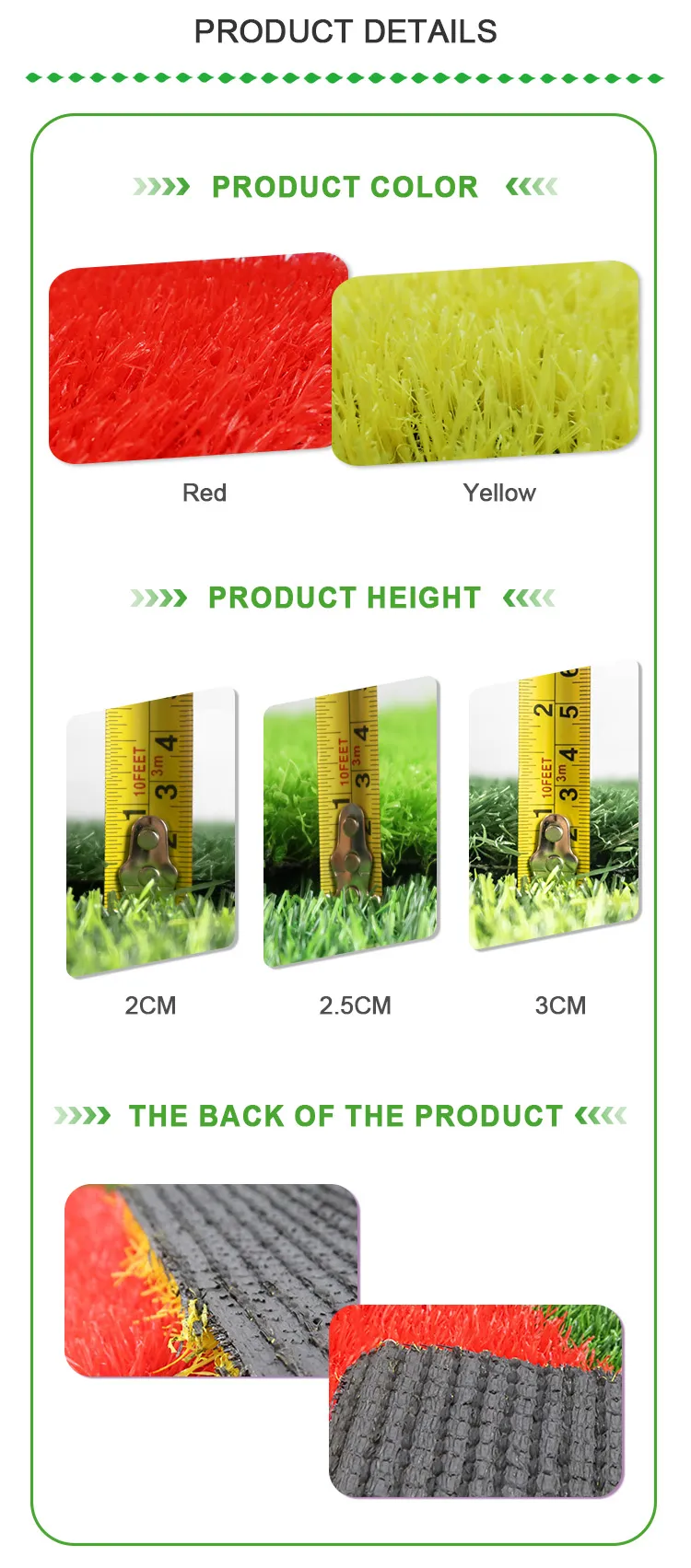
- Afrikaans
- Arabic
- Belarusian
- Bengali
- Czech
- Danish
- Dutch
- English
- Esperanto
- Estonian
- Finnish
- French
- German
- Greek
- Hindi
- Hungarian
- Icelandic
- Indonesian
- irish
- Italian
- Japanese
- kazakh
- Rwandese
- Korean
- Kyrgyz
- Lao
- Latin
- Latvian
- Malay
- Mongolian
- Myanmar
- Norwegian
- Persian
- Polish
- Portuguese
- Romanian
- Russian
- Serbian
- Spanish
- Swedish
- Tagalog
- Tajik
- Thai
- Turkish
- Turkmen
- Ukrainian
- Urdu
- Uighur
- Uzbek
- Vietnamese
Synthetic Turf Installation on Sloping Landscape for Enhanced Aesthetic Appeal
Dec . 05, 2024 17:13 Back to list
The Allure of Fake Grass on Hills A Modern Solution to an Age-Old Problem
In the quest for the perfect outdoor aesthetics, homeowners and landscape designers alike are increasingly turning to a novel solution fake grass. Among the many applications of synthetic turf, its installation on hillsides is becoming particularly popular. This trend is not merely about the appearance; it encompasses a variety of practical benefits and environmental considerations that can transform the way we think about landscaping.
Firstly, lawns on hills can be notoriously challenging to maintain. Natural grass tends to suffer from erosion due to runoff, which can lead to patches of bald earth and muddy hillsides, especially during heavy rains. The uneven terrain complicates mowing and watering, making upkeep a cumbersome task. In contrast, fake grass offers a uniform surface that can withstand the elements without losing its charm. It eliminates soil erosion, retaining both its form and color throughout all seasons, thereby preserving the aesthetic appeal of any landscape design.
Moreover, synthetic grass requires significantly less water compared to its natural counterparts. With growing concerns about water scarcity and environmental sustainability, particularly in regions prone to drought, the adoption of fake grass can be a responsible choice. Hillsides covered in synthetic turf are drought-proof, eliminating the need for regular watering and conserving valuable resources. This not only reduces water costs but also aligns with the practices of environmentally conscious homeowners who strive to minimize their ecological footprint while maintaining beautiful surroundings.
Installation of fake grass on hillsides can also address other common problems associated with natural grass in sloped areas. The artificial turf is designed to drain easily, reducing puddles that can form on uneven ground. This drainage capability minimizes the risk of slips and falls, creating a safer environment for families and pets. Additionally, since synthetic grass doesn't require fertilizers and pesticides, it lowers the risk of chemical runoff, which can harm local waterways and ecosystems. Thus, fake grass serves both aesthetic and environmental functions, fostering safer, cleaner communities.
fake grass on hill

From an aesthetic standpoint, fake grass provides an evergreen landscape. Homeowners can enjoy the lush, green appearance of a well-manicured lawn year-round, irrespective of seasonal changes. Designers can incorporate vibrant colors and textured options that mimic the look of natural grass, providing a tailor-made solution for every hillside. This permanence means families can host outdoor gatherings and children can play without concern for the typical wear and tear that comes with natural grass.
Furthermore, synthetic turf can greatly expand the usability of hilly properties. Many homeowners struggle to find functional outdoor spaces in yards with steep grades. However, the even surface created by fake grass opens up a multitude of recreational opportunities, such as installing putting greens, play areas, or even outdoor lounges. This flexibility empowers homeowners to maximize their outdoor living spaces, offering entertainment and relaxation options that were previously limited.
The increasing popularity of fake grass on hillsides reflects a broader shift in outdoor landscaping trends, driven by the desire for low-maintenance aesthetics and sustainable practices. As climate change continues to influence our approach to gardening and landscaping, synthetic solutions will likely become even more prevalent. Decorated with flowers, furniture, or even art, a hillside adorned with fake grass can become a vibrant centerpiece of a home, reflecting personal style while providing practical benefits.
In conclusion, the decision to incorporate fake grass on hills is not simply a cosmetic one; it represents a holistic approach to landscape design that balances beauty with utility and sustainability. By embracing this modern solution, homeowners can enhance their properties and contribute positively to the environment, creating outdoor spaces that are not only visually appealing but also ecologically responsible. In a world that increasingly values sustainability and practicality, fake grass stands as a testament to innovative thinking in landscaping.
-
The Benefits of Artificial Turf for Indoors
NewsJul.15,2025
-
How Artificial Grass Suppliers Ensure Quality Products
NewsJul.15,2025
-
Artificial Grass and Pets: A Space for Relaxation
NewsJul.08,2025
-
Balcony & Outdoor Decoration with Artificial Grass
NewsJul.08,2025
-
Best Indoor Artificial Grass for Home
NewsJul.07,2025
-
Best Pet Turf for Dogs: Safe & Durable Artificial Grass Options
NewsJul.07,2025
Products categories









